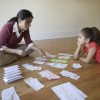 On your road to building wealth, you may choose to engage financial professionals for guidance. Seeking out professional advice will include fees and expenses, so use care when selecting the appropriate services. There is a variety of financial professionals to choose from, including financial planners, investment specialists, accountants, attorneys, insurance agents, and bankers. Understanding the roles, expertise, and credentials of these individuals can help you select the most appropriate individual or team for your specific financial needs.
On your road to building wealth, you may choose to engage financial professionals for guidance. Seeking out professional advice will include fees and expenses, so use care when selecting the appropriate services. There is a variety of financial professionals to choose from, including financial planners, investment specialists, accountants, attorneys, insurance agents, and bankers. Understanding the roles, expertise, and credentials of these individuals can help you select the most appropriate individual or team for your specific financial needs.
This 4-page fact sheet was written by Brenda C. Williams, Diann Douglas, Martie Gillen, and Lynda Spence, and published by the UF Department of Family Youth and Community Sciences, July 2013.
http://edis.ifas.ufl.edu/fy1370
Category: Money Matters
Women and Money: Unique Issues: Your Money Matters
 Couples considering a future together should discuss money before they marry. Discussing money may not be the most romantic gesture, but this is an important conversation to have early in a relationship and to continue to have throughout your marriage.This 4-page fact sheet was written by Diann Douglas and Martie Gillen, and published by the UF Department of Family Youth and Community Sciences, September 2013.
Couples considering a future together should discuss money before they marry. Discussing money may not be the most romantic gesture, but this is an important conversation to have early in a relationship and to continue to have throughout your marriage.This 4-page fact sheet was written by Diann Douglas and Martie Gillen, and published by the UF Department of Family Youth and Community Sciences, September 2013.
http://edis.ifas.ufl.edu/fy046
Women and Money: Unique Issues – So You Want to Remarry? (FCS7249/FY1353)
 Whether widowed or divorced, if a second marriage is in your future, it may be advisable to look before you leap. Second marriages have a higher failure rate than first marriages. They are often more complex and have stresses not found in many first marriages. Take your time to consider all of the financial circumstances between you and your future spouse before you remarry. This 3-page fact sheet was written by Diann Douglas, Martie Gillen, and Lynda Spence, and published by the UF Department of Family Youth and Community Sciences, March 2013.
Whether widowed or divorced, if a second marriage is in your future, it may be advisable to look before you leap. Second marriages have a higher failure rate than first marriages. They are often more complex and have stresses not found in many first marriages. Take your time to consider all of the financial circumstances between you and your future spouse before you remarry. This 3-page fact sheet was written by Diann Douglas, Martie Gillen, and Lynda Spence, and published by the UF Department of Family Youth and Community Sciences, March 2013.
http://edis.ifas.ufl.edu/fy1353
Women and Money: Unique Issues: Protecting Your Assets
 Protecting your assets is similar to managing your risks. Managing risks means identifying and evaluating instances where you may experience a financial loss and then making a plan for how to deal with the situation. This publication shares some common ways you can protect your assets by purchasing different types of insurance, being aware of identity theft or fraud, and monitoring your credit reports. This 4-page fact sheet was written by Lynda Spence, Martie Gillen, and Diann Douglas, and published by the UF Department of Family Youth and Community Sciences, July 2013.
Protecting your assets is similar to managing your risks. Managing risks means identifying and evaluating instances where you may experience a financial loss and then making a plan for how to deal with the situation. This publication shares some common ways you can protect your assets by purchasing different types of insurance, being aware of identity theft or fraud, and monitoring your credit reports. This 4-page fact sheet was written by Lynda Spence, Martie Gillen, and Diann Douglas, and published by the UF Department of Family Youth and Community Sciences, July 2013.
http://edis.ifas.ufl.edu/fy1375
Family Records (FCS7103/HE988)
 This publication should be kept in a safe place known to adult members of your family and/or trusted friend(s). An additional copy should be kept in a safe deposit box. Revise it annually or after any life-changing circumstance to keep vital information current. This can make looking for vital records much faster and easier. It can also be used as a starting place for estate planning. These checklists provide suggestions on where to keep your important papers and what information to keep. This 14-page fact sheet was written by Brenda C. Williams, Brittany Seamon, and Martie Gillen, and published by the UF Department of Family Youth and Community Sciences, April 2013.
This publication should be kept in a safe place known to adult members of your family and/or trusted friend(s). An additional copy should be kept in a safe deposit box. Revise it annually or after any life-changing circumstance to keep vital information current. This can make looking for vital records much faster and easier. It can also be used as a starting place for estate planning. These checklists provide suggestions on where to keep your important papers and what information to keep. This 14-page fact sheet was written by Brenda C. Williams, Brittany Seamon, and Martie Gillen, and published by the UF Department of Family Youth and Community Sciences, April 2013.
http://edis.ifas.ufl.edu/he988
Women and Money: Unique Issues: Money and the Family (FCS7250/FY1354)
 Ask any parent and he or she will tell you — it costs money to raise children. Taking into account inflation, a middle-income family may spend more than $295,000 to raise a child born in 2011 to the age of 17. This is not a small amount of money, so you will need to know the types of expenses required to raise your family. This 5-page fact sheet reviews the costs associated with raising children and gives you tips on how to teach your children about finances. By knowing the costs of raising your family and setting up a budget, you can teach your children money management skills that will help them throughout their lives. Written by Lynda Spence, Martie Gillen, and Diann Douglas, and published by the UF Department of Family Youth and Community Sciences, March 2013.
Ask any parent and he or she will tell you — it costs money to raise children. Taking into account inflation, a middle-income family may spend more than $295,000 to raise a child born in 2011 to the age of 17. This is not a small amount of money, so you will need to know the types of expenses required to raise your family. This 5-page fact sheet reviews the costs associated with raising children and gives you tips on how to teach your children about finances. By knowing the costs of raising your family and setting up a budget, you can teach your children money management skills that will help them throughout their lives. Written by Lynda Spence, Martie Gillen, and Diann Douglas, and published by the UF Department of Family Youth and Community Sciences, March 2013.
http://edis.ifas.ufl.edu/fy1354
Women and Money: Unique Issues: Money Issues across the Life Cycle (FCS7248/FY1352)
 Most families depend on a woman’s income to help support the household. Some women are co-breadwinners while others are the only source of income. Throughout a woman’s life, she will experience many money issues unique to women. A woman may experience the following situations: lower earnings, a longer life expectancy, lack of retirement planning, divorce, and fewer years in the workplace because of childrearing or caring for older parents. Many of these issues can work against a woman’s ability to accumulate money and attain stable financial status. This 3-page fact sheet was written by Diann Douglas, Martie Gillen, and Lynda Spence, and published by the UF Department of Family Youth and Community Sciences, March 2013.
Most families depend on a woman’s income to help support the household. Some women are co-breadwinners while others are the only source of income. Throughout a woman’s life, she will experience many money issues unique to women. A woman may experience the following situations: lower earnings, a longer life expectancy, lack of retirement planning, divorce, and fewer years in the workplace because of childrearing or caring for older parents. Many of these issues can work against a woman’s ability to accumulate money and attain stable financial status. This 3-page fact sheet was written by Diann Douglas, Martie Gillen, and Lynda Spence, and published by the UF Department of Family Youth and Community Sciences, March 2013.
http://edis.ifas.ufl.edu/fy1352
Retirement Need Analysis: How Much of My Current Income Will I Need for Retirement? (FCS7251/FY1355)
 The amount of money needed for retirement varies from person to person. There may not be an exact amount, but there are ways to estimate the amount you will need. While no “magic number” exists for the amount you should save for retirement, there are calculations you can use to estimate the amount you will need. Calculating your wage replacement ratio (WRR) using either the top-down or bottom-up approach can help you determine how much money you should put aside for retirement and provide you with savings goals. This 3-page fact sheet was written by Jorge Ruiz-Menjivar and Martie Gillen, and published by the UF Department of Family Youth and Community Sciences, March 2013.
The amount of money needed for retirement varies from person to person. There may not be an exact amount, but there are ways to estimate the amount you will need. While no “magic number” exists for the amount you should save for retirement, there are calculations you can use to estimate the amount you will need. Calculating your wage replacement ratio (WRR) using either the top-down or bottom-up approach can help you determine how much money you should put aside for retirement and provide you with savings goals. This 3-page fact sheet was written by Jorge Ruiz-Menjivar and Martie Gillen, and published by the UF Department of Family Youth and Community Sciences, March 2013.
http://edis.ifas.ufl.edu/fy1355
Mutual Funds (FCS5266/FY1351)
 Mutual funds are open-end investment companies that use a pool of many investors’ money to buy shares of different investments. They can be an effective way for the average investor to build a diverse portfolio. Although these funds come with fees, taxes, and, in the case of load funds, commissions, an investor still has the potential to achieve positive returns and beat inflation. This 4-page fact sheet was written by Lisa Leslie and Michael S. Gutter, and published by the UF Department of Family Youth and Community Sciences, February 2013.
Mutual funds are open-end investment companies that use a pool of many investors’ money to buy shares of different investments. They can be an effective way for the average investor to build a diverse portfolio. Although these funds come with fees, taxes, and, in the case of load funds, commissions, an investor still has the potential to achieve positive returns and beat inflation. This 4-page fact sheet was written by Lisa Leslie and Michael S. Gutter, and published by the UF Department of Family Youth and Community Sciences, February 2013.
http://edis.ifas.ufl.edu/fy1351
Coping with a Money Crunch: Family Cooperation (FCS7005/FY227)
 It’s easy to say that financial problems, such as losing your job, should be shared with your family. But it’s hard to know just how to do that. One method of bringing the family together with a feeling of team spirit is a family council meeting. This is a simple strategy for bringing a harmonious pattern into the family routine. This 2-page fact sheet was published by the UF Department of Family Youth and Community Sciences, December 2012.
It’s easy to say that financial problems, such as losing your job, should be shared with your family. But it’s hard to know just how to do that. One method of bringing the family together with a feeling of team spirit is a family council meeting. This is a simple strategy for bringing a harmonious pattern into the family routine. This 2-page fact sheet was published by the UF Department of Family Youth and Community Sciences, December 2012.
http://edis.ifas.ufl.edu/fy227
Women and Money: Unique Issues – Finances in a Divorce (FCS7247/FY1349)
 Separation and divorce impact family financial management on multiple levels. Women going through a divorce will have reduced resources and the added expenses of the divorce process. If you are going through a divorce, you should carefully examine the financial factors listed in this publication. Also, you should know that sensible planning may help to lessen the financial stress associated with the transition from marriage to divorce. This 7-page fact sheet was written by Lynda Spence, Martie Gillen, and Diann Douglas, and published by the UF Department of Family Youth and Community Sciences, January 2013.
Separation and divorce impact family financial management on multiple levels. Women going through a divorce will have reduced resources and the added expenses of the divorce process. If you are going through a divorce, you should carefully examine the financial factors listed in this publication. Also, you should know that sensible planning may help to lessen the financial stress associated with the transition from marriage to divorce. This 7-page fact sheet was written by Lynda Spence, Martie Gillen, and Diann Douglas, and published by the UF Department of Family Youth and Community Sciences, January 2013.
http://edis.ifas.ufl.edu/fy1349
Financial Issues (FCS2212/FY627)
 Although we cannot foresee unexpected events, planning can help us control some financial issues that may arise. This 4-page fact sheet highlights the main financial poblems older adults face during retirements, and solutions to help plan and manage a successful retirement. Written by Martie Gillen and Josephine Turner, and published by the UF Department of Family Youth and Community Sciences, November 2012.
Although we cannot foresee unexpected events, planning can help us control some financial issues that may arise. This 4-page fact sheet highlights the main financial poblems older adults face during retirements, and solutions to help plan and manage a successful retirement. Written by Martie Gillen and Josephine Turner, and published by the UF Department of Family Youth and Community Sciences, November 2012.
http://edis.ifas.ufl.edu/fy627
Cutting Costs to Live Within Your Income (FCS7009/HE153)
 Developing self-control of your spending is a basic step in cutting the cost of living. Some families are able to afford what they want, even on a limited income. This may result from having more experience or greater skills. You probably know specific things you could do to reduce spending. These suggestions may work for you. This 3-page fact sheet was written by Josephine Turner, Michael S. Gutter, and Nayda I. Torres, and published by the UF Department of Family Youth and Community Sciences, October 2012.
Developing self-control of your spending is a basic step in cutting the cost of living. Some families are able to afford what they want, even on a limited income. This may result from having more experience or greater skills. You probably know specific things you could do to reduce spending. These suggestions may work for you. This 3-page fact sheet was written by Josephine Turner, Michael S. Gutter, and Nayda I. Torres, and published by the UF Department of Family Youth and Community Sciences, October 2012.
http://edis.ifas.ufl.edu/he153
Enviroshopping for Teens (FCS8756/FY342)
 Every day, we make choices that impact our environment. This 3-page fact sheet will help you make environmentally friendly choices whenever you make purchases and encourage you to take a second look at items before throwing them away. Written by Linda B. Bobroff and R. Elaine Turner, and published by the UF Department of Family Youth and Community Sciences, September 2012.
Every day, we make choices that impact our environment. This 3-page fact sheet will help you make environmentally friendly choices whenever you make purchases and encourage you to take a second look at items before throwing them away. Written by Linda B. Bobroff and R. Elaine Turner, and published by the UF Department of Family Youth and Community Sciences, September 2012.
http://edis.ifas.ufl.edu/fy342
Building a Spending Plan series
 Follow the six steps in this series to learn how to calculate your expenses and determine your financial goals. With this information, you can compare your expenses against your income to find out how to best budget your money. Fill out these worksheets to build your own spending plan. These fact sheets were written by Nayda I. Torres, Josephine Turner, and Brenda C. Williams, and published by the UF Department of Family, Youth, and Community Sciences, July 2012. http://edis.ifas.ufl.edu/topic_series_building_a_spending_plan
Follow the six steps in this series to learn how to calculate your expenses and determine your financial goals. With this information, you can compare your expenses against your income to find out how to best budget your money. Fill out these worksheets to build your own spending plan. These fact sheets were written by Nayda I. Torres, Josephine Turner, and Brenda C. Williams, and published by the UF Department of Family, Youth, and Community Sciences, July 2012. http://edis.ifas.ufl.edu/topic_series_building_a_spending_plan
Parents' Spending on Teens (FAR1209/FM421)
 “In a recent study from Teenage Research Unlimited, researchers reported that teens spent $159 billion in 2005. My own experience raising three teens led me to believe that many of them spent their parents’ money in 2005.” This 2-page Family Album Radio transcript was written by Donna Davis, and published by the UF Department of Family Youth and Community Sciences, July 2012.
“In a recent study from Teenage Research Unlimited, researchers reported that teens spent $159 billion in 2005. My own experience raising three teens led me to believe that many of them spent their parents’ money in 2005.” This 2-page Family Album Radio transcript was written by Donna Davis, and published by the UF Department of Family Youth and Community Sciences, July 2012.
http://edis.ifas.ufl.edu/fm421
Home Buying and Your Credit Report (FCS3217/HE714)
 Before you purchase a house, you need to look over your credit report. Your credit history will affect whether or not a bank will give you a loan, as well as the interest rate you will be charged. This 3-page fact sheet was written by Martie Gillen and Virginia Peart, and published by the UF Department of Family Youth and Community Sciences, July 2012.
Before you purchase a house, you need to look over your credit report. Your credit history will affect whether or not a bank will give you a loan, as well as the interest rate you will be charged. This 3-page fact sheet was written by Martie Gillen and Virginia Peart, and published by the UF Department of Family Youth and Community Sciences, July 2012.
http://edis.ifas.ufl.edu/he714
Coping with a Money Crunch: Values, Goals, and Standards (FCS7006/FY228)
 As a consumer, having an array of choices is usually a good thing. But having to make choices can also be a problem. New products, services, and ways of doing things are being developed all the time. It’s even more difficult to make decisions when you’re experiencing a money crunch. This 3-page fact sheet was written by Michael S. Gutter, Josephine Turner, and Katey Walker, and published by the UF Department of Family Youth and Community Sciences, July 2012.
As a consumer, having an array of choices is usually a good thing. But having to make choices can also be a problem. New products, services, and ways of doing things are being developed all the time. It’s even more difficult to make decisions when you’re experiencing a money crunch. This 3-page fact sheet was written by Michael S. Gutter, Josephine Turner, and Katey Walker, and published by the UF Department of Family Youth and Community Sciences, July 2012.
http://edis.ifas.ufl.edu/fy228
Before You Go: Organizing Family Legal Matters and Finances Prior to Military Deployment (FCS7426/FY1328)
 Military members and their families have many things to prepare before deployment, so it is easy to overlook some important issues. This 3-page fact sheet helps military service members and their families take care of their financial and legal matters before deployment. Written by William Parker and Heidi Liss Radunovich, and published by the UF Department of Family Youth and Community Sciences, June 2012.
Military members and their families have many things to prepare before deployment, so it is easy to overlook some important issues. This 3-page fact sheet helps military service members and their families take care of their financial and legal matters before deployment. Written by William Parker and Heidi Liss Radunovich, and published by the UF Department of Family Youth and Community Sciences, June 2012.
http://edis.ifas.ufl.edu/fy1328
Employer Sponsored Retirement Savings Plans (FCS5258b/FY1286)
 A financially secure retirement is a goal for many workers, and the ability to achieve that plan can be helped by employer-sponsored retirement plans. Learn more in this 3-page fact sheet written by Rachel Dorman, Lisa M. Leslie, Michael S. Gutter, Martie Gillen, and Josephine Turner, and published by the UF Department of Family Youth and Community Sciences, April 2012.
A financially secure retirement is a goal for many workers, and the ability to achieve that plan can be helped by employer-sponsored retirement plans. Learn more in this 3-page fact sheet written by Rachel Dorman, Lisa M. Leslie, Michael S. Gutter, Martie Gillen, and Josephine Turner, and published by the UF Department of Family Youth and Community Sciences, April 2012.
http://edis.ifas.ufl.edu/fy1286